Kubrick: Barry Lyndon part 7
SCENE 63. We come back from intermission to find a title card announcing that the remainder of Barry Lyndon will be about Barry’s fall from good fortune. The first part of the movie — the first six acts — were about Barry’s rise to wealth and power, and the second part will concern his undoing.
That would make Scene 63, which shows the wedding of Barry to Lady Lyndon, dramatically, the pinnacle of Barry’s joy. He’s gone from being a love-sick middle-class goon to being married to a genuine capital-L Lady. He’s been re-born a number of times so far in the movie, but the wedding is the moment where he has finally, he feels, entered into his true domain: a gentleman of wealth and taste.
We see Barry’s allies in attendance at his wedding: the Chevalier de Balibari and his mother are both there lending their support. If Barry’s mother sees anything untoward in her son’s marriage, she doesn’t show it: she, too, seems to feel that she has finally entered her proper sphere at the mother to a gentleman of wealth and taste.
Reverend Runt performs the ceremony, and Kubrick gives special emphasis on the nature of marriage among nobles in 1773. Marriage, says Runt, is what saves humans from acting “in carnal lust, like brute beasts,” and that marriage is something to be entered into “soberly, and in the fear of God.” We can almost see Barry’s smirk — he’s seen enough of life in the Seven Years’ War to know that men are brute beasts, and enough injustice to know there is no God.
Where are our themes now? Runt addresses violence in its absence, Barry has reached the pinnacle of his social climb, and love, we are meant to gather, is nowhere in evidence.
The scene also suggests the question, what does Lady Lyndon want out of this? Does she think Barry is actually a gentleman, or has he merely succeeded in flattering her to the point where she doesn’t care? As the narrative progresses, her son Lord Bullingdon (here seen staring daggers at Barry during the wedding ceremony) routinely accuses Barry of being, well, of being who he is: a base-born Irish social climber. Lady Lyndon’s husband Charles bellowed the same thing, so it’s hard to imagine that the thought never crossed the Lady’s mind. On the other hand, Lady Lyndon is still young, and, based on the evidence, did not have a satisfying sex life with her husband. The narrative does not say, but one wonders how Lady Lyndon ended up married to Charles in the first place. They have an 11-year-old son, so she must have been quite young when she was married off to Sir Charles. Maybe she was traded to Sir Charles by her own father, who was a social climber much like Barry. Maybe she knows, to some extent anyway, who Barry is and what a fraud he is, and accepts him on face value. In any case, suffice to say, the movie does not dig very deep below the surface of Lady Lyndon’s motivations: she remains, almost entirely, a porcelain doll in a gilded case.
Scene 64. One important question to ask about Barry Lyndon, or any of Kubrick’s movies, is: how does the narrative want us to feel about its protagonist? We root for Alex as he commits unspeakable acts, we tear up when the murderous HAL 9000 gets a lobotomy.
Barry Lyndon goes pretty far into tipping its hat in this regard. In Scene 64, Kubrick shows Barry and Lady Lyndon riding in a coach, with Barry smoking a pipe, full of happiness and pride at having achieved his goal. Lady Lyndon asks him if he could please stop smoking for a while, and he turns and blows smoke in her face. Then, on top of this enormity, he smiles and kisses her on the nose, then goes back to smoking. It’s a scene not difficult to parse: Barry is an arrogant jerk, rubbing the Lady’s face in the fact that she’s trapped now, in a (second?) loveless marriage, and there’s nothing she can do about it. Whatever good will we’ve had toward Barry and his various capers almost entirely evaporates here. It’s a real kick-the-dog moment. To bolster the image, the narrator informs us that Lady Lyndon was, to Barry, nothing more than a decoration, no different from a carpet or a painting, a prop for him to use to play out his charade of being a gentleman.
Scene 65. Following along on the same road is Reverend Runt and young Lord Bullingdon. Bullingdon speaks his mind about Barry, and while Runt doesn’t say anything outright, we can see the wheels turning in his head: he, too, wants Barry out of the Lady’s life, although for different reasons than Bullingdon. Bullingdon, like his father, sees his class, his social standing, as something sacred, something ordained by divine will, while Barry is an unholy interloper there to rape and pillage his good name and estate. Runt tut-tut’s him, but we also see that he, in his passive-aggressive way, is feeding Bullingdon enough rope to keep his hatred of Barry stoked.
Scene 66. The narrator informs us that Barry and Lady Lyndon conspire to create a son, Bryan. At this point, Bryan is little more than a plot point, something to weld Lady Lyndon to Barry, but, we shall see, Bryan represents our old theme, love, entering the picture again.
Scene 67. How is Barry as a husband? Not very attentive, we’re told. We see him at a brothel, making out with two women while some soldiers in the background sing “The British Grenadiers,” which is the song to which Barry’s father-figure Captain Grogan marched to his death. The presence of the army men suggests both that this brothel is perhaps some sort of officers’ club, and that Barry is, of all things, nostalgic for his time spent in the presence of the reprobates and thieves of the British army. For good measure, a young officer is shown passed out in a chair directly to Barry’s right, the second time a man is found in that condition, but not the last.
Scene 68. In one of the more striking tableaux of the movie, Lady Lyndon, Lord Bullingdon and the infant Bryan recline and stare out at the nothingness as the narrator informs us that Lady Lyndon’s life, during her marriage to Barry, was severely restricted. Whatever joy she’d had before her marriage — and she met him, after all, at a gaming table — is gone now, at Barry’s insistence, as she not only assumes the look of a porcelain doll but the mobility of one. Again, the motionlessness of the scene is intentional, not only to evoke the conversation pieces of the day but to show Lady Lyndon as Barry sees her: a toy put up on a shelf, no more or less interesting than the books displayed behind her.
Scene 69. As Lady Lyndon practices a music piece with Runt and Lord Bullingdon, the narrator further informs us as to the Lady’s imprisonment in her home. Her life is insular now, her friends are Runt and Bullingdon, her cage is ornately gilded but still a cage.
Scene 70. Lady Lyndon is out for a stroll with Runt and Bullingdon, and happens upon Barry making out with one of her nursemaids, with Bryan, in his stroller, asleep nearby. In this moment of primal emotions, Kubrick decides to have the narrator inform us that the Lady’s son, Lord Bullingdon, is a “melancholy and maudlin” child, as he reaches to take his mother’s hand when he sees Barry betraying his mother. That is to say, in this scene that would normally belong to Lady Lyndon, Kubrick instead chooses to start a subplot into motion, one about Bullingdon’s hatred toward Barry and his steadily-building case against him. Lady Lyndon is frozen in place even in the moment of her betrayal.
Scene 71. The next time we see Lady Lyndon, she is up late playing cards with Runt and a couple of lady friends. The placement of this scene has always mystified me, since the logical thing to show after Lady Lyndon’s betrayal would be her reacting to that betrayal. But now I realize, this scene is that reaction: Lady Lyndon, by playing cards, late at night, with her girlfriends, participating in a minor act of rebellion. The scene is as still as any other in the movie, but at least Lady Lyndon is seeing friends, not just her son and Runt, and she’s at least trying to regain a portion of her old life, playing cards. And cards is, after all, Barry’s game. Perhaps she’s trying to re-live that moment when she first met him and life seemed to hold the possibility of happiness, perhaps she’s trying, through playing cards, to better understand her rogue husband’s motivations. Whatever she’s looking for, she doesn’t get it, and her air of resignation and despair is palpable.
Scene 72. Next in this little mini-movie about Lady Lyndon’s life, we see her, again frozen in place, half-submerged in a bathtub that might as well be filled with cement for all the freedom of movement it offers. One woman reads to her in French and another, well, does not. It’s hard to say what the second woman is doing there, she’s obviously of a higher station than a maid, with her hair piled into a sculpture a foot off her head, but her role in Lady Lyndon’s life is left mysterious. The impression I get from the scene is, as an extension from the previous scene, that Lady Lyndon is trying, in her frozen way, to retain friendships and find some measure of her own identity while trapped in this brutal marriage.
In any case, Barry enters the room and sends the women out, then goes to Lady Lyndon in her tub and apologizes, presumably for having the poor taste to make out with the nursemaid while on estate grounds.
Why does he apologize? Is he sorry? It’s hard to imagine that he is. There’s no other indication in the movie that he is. He doesn’t change his ways or become more involved in Lady Lyndon’s life, he doesn’t become more faithful or devote himself more to her. But Lady Lyndon is so starved for love that she forgives him. As for why the scene is there at all, the next scene gives us a clue.
Scene 73. Barry meets with some clothiers about getting some new outfits. Lady Lyndon comes by, with Bryan and Bullingdon, on their way out for a walk. Lady Lyndon has a pair of ladies-in-waiting with her. Has Barry had sex with one of them? Both of them? We don’t know, but the odds are good. In any case, the thrust of the scene is that Barry kisses his infant son Bryan good-bye, and then goes to kiss Lord Bullingdon and Bullingdon refuses.
Now we realize why the bath scene was there. Kubrick wanted a scene where Bullingdon declares war on Barry, and he needed Lady Lyndon to take Barrys’ side, and she couldn’t do that if she was still angry at him for betraying her. So he put the bath scene in to show Lady Lyndon falling in love with Barry again, and he placed Lady Lyndon in a bathtub so we’d be too busy looking at the naked lady to notice the creaky dramaturgy.
But declare war Bullingdon does, in starkly bitchy terms. “You have dishonored your father,” scolds Lady Lyndon, and Bullingdon, without dropping a beat, snaps “Madam, you have dishonored my father,” as the infant Bryan, right on cue, begins to cry, the second piece of absolutely brilliant baby acting in the movie.
Scene 73. Barry takes Bullingdon into the next room and canes him, and the subtext is clear: it’s a callback to the first scene of Act III, where Barry leads the Prussian soldier through the gauntlet. Violence is, after all, the manner in which noblemen retain their nobility, and the narrative shoe is now on the other foot. Barry has crossed his social Rubicon, he’s gone from being a footsoldier to being a quasi-lord, and the one constant in his life has been that violence is the only way to protect one’s social stature.
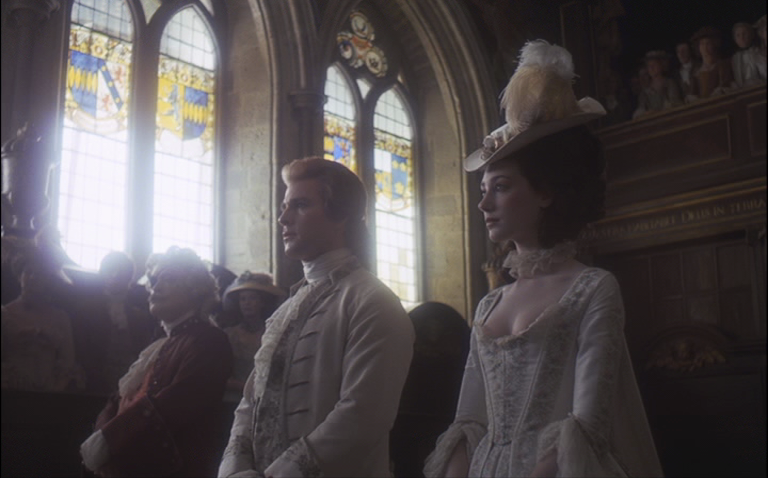


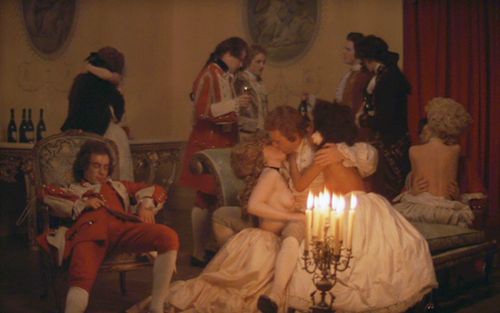
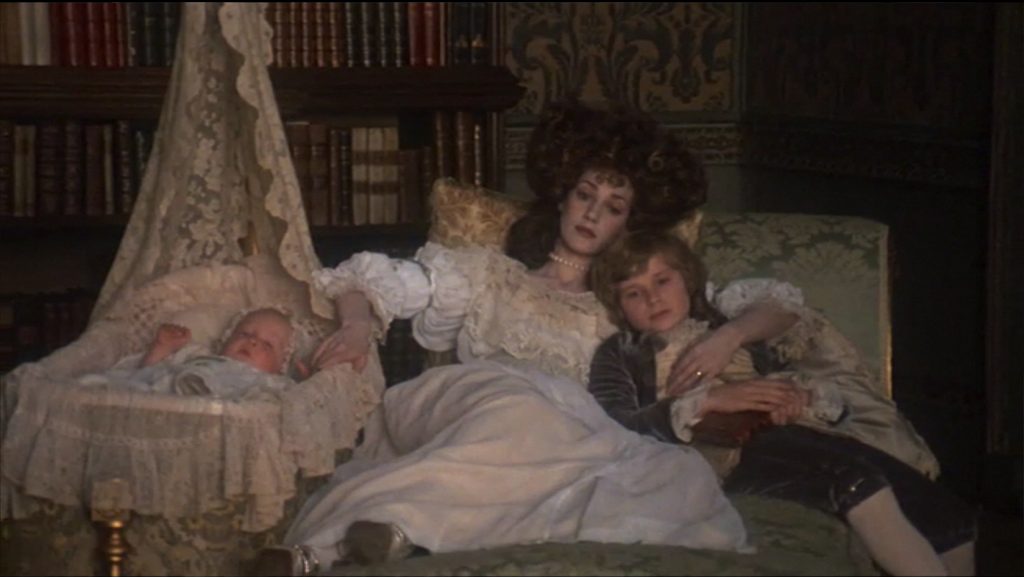
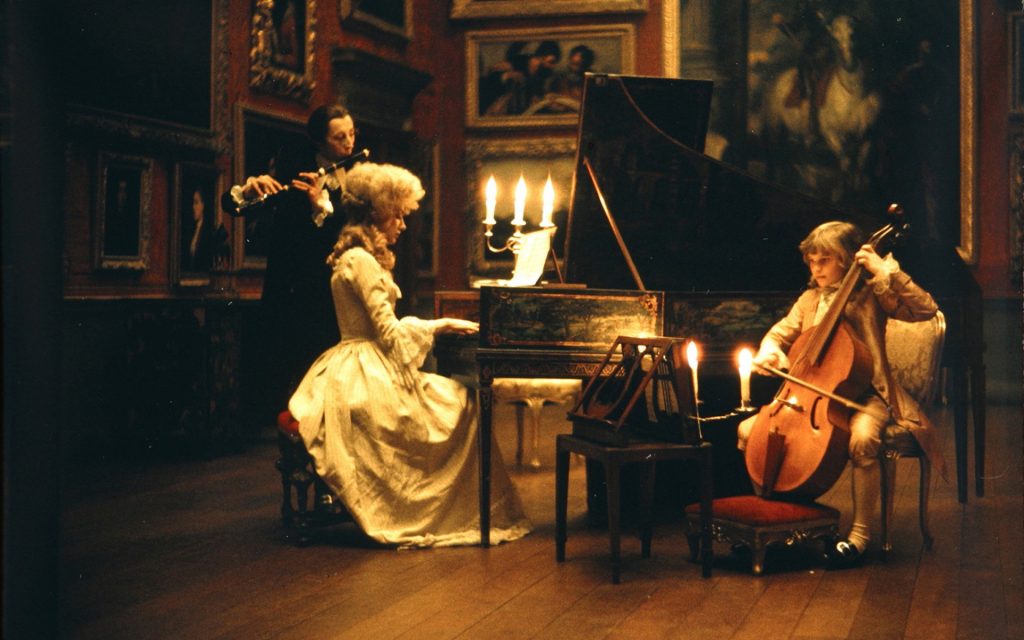

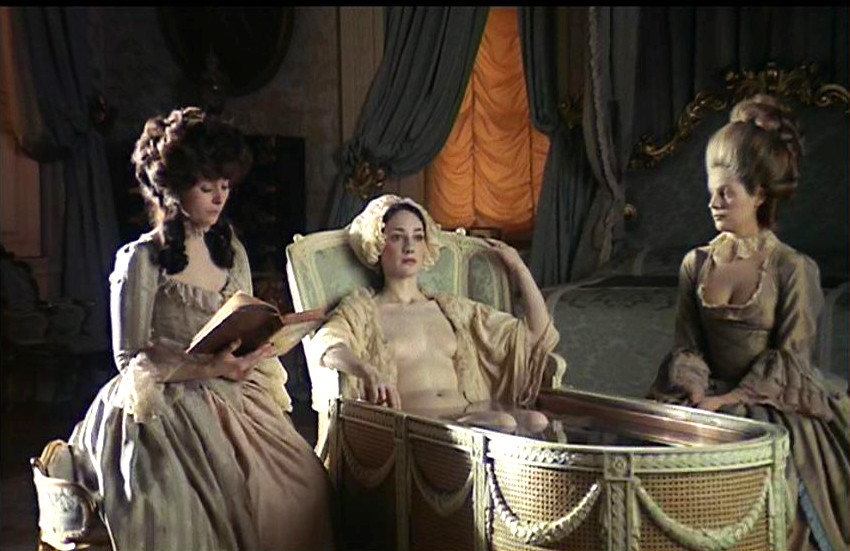
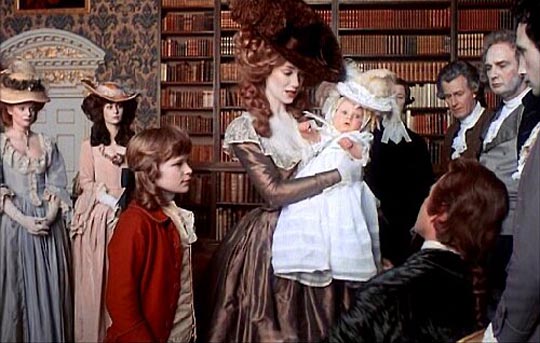

Todd, I am very interested to hear your thoughts and analyses of Blade Runner 2049 after considering these aspects of Berry Lyndon you bring up.
Another mystifying motif to me in ‘Barry Lyndon’ is the constant repetition of the number 6 throughout the film. Earlier, during the “punting on the lake” scene immediately after Barry has met Lady Lyndon, the narrator oddly comments that “within six hours, they were in love.” Potzdorf was accompanied by six mounted soldiers. Both times when Barry canes Bullingdon, he whips him six times. There are numerous other examples. But the most striking appearance of the number is in scene 68 — as the camera slowly zooms in to Lady Lyndon’s face, we see the number six clearly frosted into her hair for emphasis!